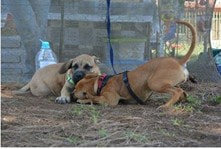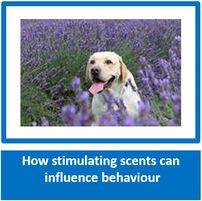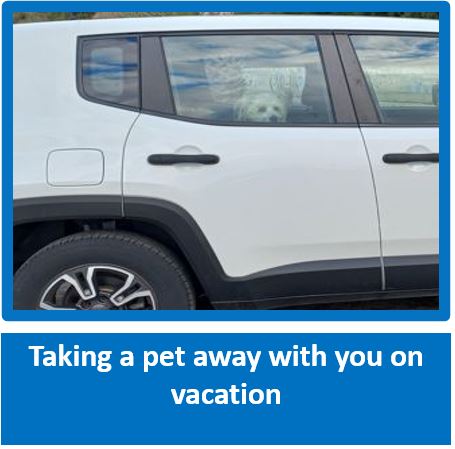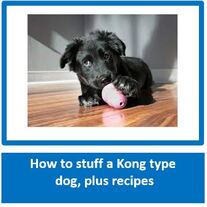|
The importance of free play and socialization is one of the most important aspects of your pup's life, however, do not neglect the mental enrichment that your pup (and older dog) requires. Letting your pup learn how to solve basic puzzles, figure how to get food out of toys etc, will go a long way to improve your dog's cognitive functions and build self confidents. Additionally relieves boredom & frustration and less likely to have behaviour concerns occur. Have a look at our excellent range of dog toys, puzzles, food toys etc on our website. www.mcmac.co.za
|
The Importance of Free Play
By Scotty Valadao - Canine Behaviourist - Friends of the Dog
Free play with other puppies is excellent as long as it is controlled and well supervised by the instructors in the class, and pups are matched by both their size and their personality - a shy pup being bullied by another pup can have a lasting, adverse effect. Of course pups should learn to socialize with other pups (and dogs) of all sizes and breeds, but when it comes to free play, they must be properly matched.
We need to remember that if a pup receives a fright while playing with other pups, that this could well affect its later behaviour (one event learning) and interaction with other dogs, which will only become more extreme unless behaviour modification is brought in to change the pups perception of other dogs.
If you are taking your pup to puppy socialization, to please ensure that free play is supervised. I have seen instances where large sized dogs were allowed to bully the smaller breeds resulting in fear behaviour. If free play is not offered at the puppy school you are looking at - then find another school. It is only by actually playing with one another that pups learn body language and what behaviours work, and which don't. They also learn to control the force of their bite (bite inhibition), and that going 'over the top' can result in a nip from another pup, or that the particular pup refuses to play further.

We, as parents, realize the importance of taking our children to play groups and pre school groups, why then do we not award the same importance to playing with other pups for our own pup? We just haven’t thought of it in that way. I would much rather have a dog that is comfortable with other dogs and has canine social skills than one who has been kept in the back yard with little or no canine social interaction, wouldn’t you?
Research done by Jaak Panksepp (Adjunct Professor. PhD. University of Massachusetts) has proven that playful interaction with other dogs forms an important part of the pup’s emotional, social and neurological development. Panksepp also says that the more our dogs play as pups, the more impulse control they’ll exhibit as adults. It’s known that dogs that have had fewer opportunities for free play as pups are more likely to exhibit aggressive behaviour as adult dogs.
Where problems sometimes occur is when owners start to interfere either by being pushy and trying to force their pups to play or else grabbing and picking up their pup when any rough play is exhibited. The interaction should be controlled by the instructor who should be qualified to run these classes.
The instructor should be able to recognize when the excitement levels are becoming too high, and gently separate the pups, and when they are calm, they are allowed to play again. This teaches the pup that the fun is not stopped completely and that it can be resumed when they are calm - also teaches self-control
Another area that play should take place in, is with the pups owners. The pup then learns to view its owners as a great source of pleasure and is more likely to grow up liking having humans around. This should not only be limited to the owners, pups should engage in structured games, such as pullies and retrieve games with the various visitors who come to the home. Please note that the owner puts in place the rules for these games, and supervises them, to ensure that they don’t get too rough. The play situation between pup and owners will result in both of you getting to know each other better, and if the pup exhibits any fear or other behaviours during play, these can be dealt with there and then, remember prevention is better than cure.
Another point where owners and pups playing can be very beneficial is that it is an ideal opportunity to bring in so many different exercises that will benefit both pup and owner. The ‘leave’ cue can be used, ‘bite inhibition’ can be worked on, the ‘sit, down, stand’ exercises can be reinforced; the ‘settle’ exercise can be practised, the ‘finished’ cue can be used to finish off a game, and I also bring in the cue ‘free’ to reinforce at the same time. Actually if you think about it, every single exercise we teach our dogs can be brought into the play situation and it is a well know fact that all species learn quicker when having fun.
A final point to think about is to bring in the good fun times when the pup is well behaved - instead of just praise and a treat, what about praise and a quick game?. If the owner uses play to divert the behaviour when the pup is misbehaving, it will just reinforce the negative behaviour.
Research done by Jaak Panksepp (Adjunct Professor. PhD. University of Massachusetts) has proven that playful interaction with other dogs forms an important part of the pup’s emotional, social and neurological development. Panksepp also says that the more our dogs play as pups, the more impulse control they’ll exhibit as adults. It’s known that dogs that have had fewer opportunities for free play as pups are more likely to exhibit aggressive behaviour as adult dogs.
Where problems sometimes occur is when owners start to interfere either by being pushy and trying to force their pups to play or else grabbing and picking up their pup when any rough play is exhibited. The interaction should be controlled by the instructor who should be qualified to run these classes.
The instructor should be able to recognize when the excitement levels are becoming too high, and gently separate the pups, and when they are calm, they are allowed to play again. This teaches the pup that the fun is not stopped completely and that it can be resumed when they are calm - also teaches self-control
Another area that play should take place in, is with the pups owners. The pup then learns to view its owners as a great source of pleasure and is more likely to grow up liking having humans around. This should not only be limited to the owners, pups should engage in structured games, such as pullies and retrieve games with the various visitors who come to the home. Please note that the owner puts in place the rules for these games, and supervises them, to ensure that they don’t get too rough. The play situation between pup and owners will result in both of you getting to know each other better, and if the pup exhibits any fear or other behaviours during play, these can be dealt with there and then, remember prevention is better than cure.
Another point where owners and pups playing can be very beneficial is that it is an ideal opportunity to bring in so many different exercises that will benefit both pup and owner. The ‘leave’ cue can be used, ‘bite inhibition’ can be worked on, the ‘sit, down, stand’ exercises can be reinforced; the ‘settle’ exercise can be practised, the ‘finished’ cue can be used to finish off a game, and I also bring in the cue ‘free’ to reinforce at the same time. Actually if you think about it, every single exercise we teach our dogs can be brought into the play situation and it is a well know fact that all species learn quicker when having fun.
A final point to think about is to bring in the good fun times when the pup is well behaved - instead of just praise and a treat, what about praise and a quick game?. If the owner uses play to divert the behaviour when the pup is misbehaving, it will just reinforce the negative behaviour.





